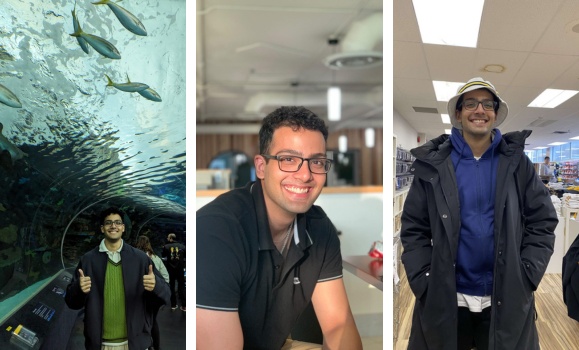This article is part of How I Spent My Summer, a series of articles showcasing opportunities Dal students pursued over the past few months ‚ÄĒ from work-intergrated learning to research positions and more. Scroll to the bottom for more articles.
Part of the appeal of a summer co-op placement is putting classroom skills into practice in ‚Äúthe real world.‚ÄĚ But what happens if your role involves creating a product...in a completely new language?
Second-year Bachelor of Computer Science (BCS) student Aryaman Pandey recently completed a 16-week co-op placement at , a website and app development company based in Halifax. Pandey, who was hired as a software developer, was mainly tasked with making small improvements to clients’ websites or apps, developing small features or fixing minor issues.
Theoretically, he understood the task. In practice, however, he had much to learn.
A new framework for understanding
At immediac, Pandey was using frameworks, which are pre-designed software components that provide a foundation for developing apps and websites. It was new territory for him.
‚ÄúI've never worked with frameworks before at all, so that was entirely new to me,‚ÄĚ Pandey says. ‚ÄúAnd I was working in an entirely new programming language as well, so at first I was really overwhelmed.‚ÄĚ
Imagine trying to fix an issue with a tool you‚Äôve never used before in a language you don‚Äôt yet speak! Pandey, to his credit, took it all in stride. ‚ÄúThe first project I was on took me so long to do really basic things,‚ÄĚ he remembers. ‚ÄúBut on the next project I was able to make things more quickly and that increased my confidence.‚ÄĚ
He also credits his mentors and co-workers for being patient, kind and understanding. ‚ÄúMy mentor was helping me with concepts that I was unfamiliar with, and she was also helping me learn the syntax, as in the rules of the programming language, making sure I was learning it properly.‚ÄĚ
Learning outside of the classroom
Pandey notes that, along with the concrete skills he learned at immediac, he also absorbed some soft skills too, like time management and communication.
‚ÄúCommunication was a big one for me because I was working on the development team, and might have to talk to the VP or somebody who was not from a technical background,‚ÄĚ he explains. ‚ÄúHow do I tell someone what this bug is about without going deep into the technicality of it? But I just had to find a way to be understood.‚ÄĚ
Some of those soft skills are not explicitly taught in the classroom, which is often more focused on the theoretical or academic aspect of computer science. ‚ÄúI realized when I was working at immediac, that if I hadn't learned the theory part of it, I wouldn't have been able to perform as well,‚ÄĚ Pandey says.
Pandey wants other students to know they don’t have to know everything about a role before starting something new. Approaching a new opportunity with a growth mindset is the best chance at success.
Plans for the 2024-25 academic year
Pandey is right back in the thick of things in the middle of his second year of BCS, and is looking forward to a busy year of studies, rock climbing with friends, and TAing and marking.
‚ÄúHaving part-time jobs while studying has helped me understand how important time management and just being organized is,‚ÄĚ he says. ‚ÄúAnd it has helped me understand what I want to do in the future a little bit better. I really liked the development aspect of my co-op, so I want to try different parts of that, and maybe dev ops as well.‚ÄĚ The possibilities and opportunities are boundless, and Pandey wants to try it all. ‚ÄúI want to try many different roles, so I know what I want to do before graduating.‚ÄĚ

